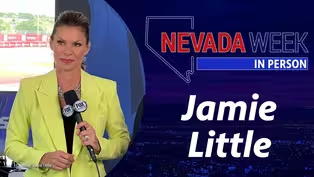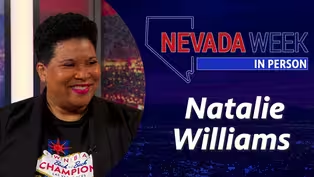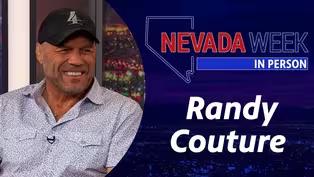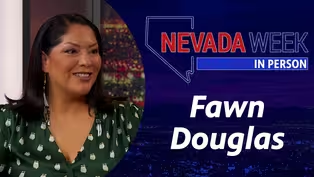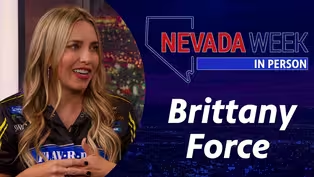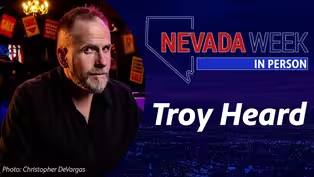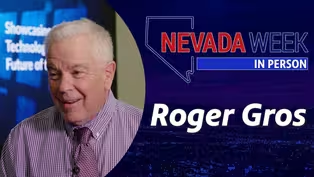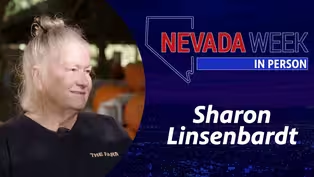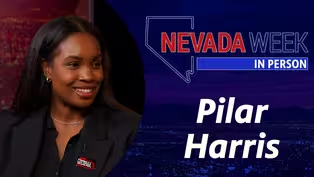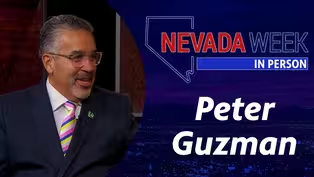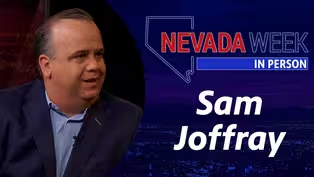
Nevada Week In Person | Kelvin Watson
Season 1 Episode 78 | 14mVideo has Closed Captions
Interview with Kelvin Watson, Executive Director of Las Vegas-Clark County Library Distri
One-on-one interview with Kelvin Watson, Executive Director of Las Vegas-Clark County Library District
Problems playing video? | Closed Captioning Feedback
Problems playing video? | Closed Captioning Feedback
Nevada Week In Person is a local public television program presented by Vegas PBS

Nevada Week In Person | Kelvin Watson
Season 1 Episode 78 | 14mVideo has Closed Captions
One-on-one interview with Kelvin Watson, Executive Director of Las Vegas-Clark County Library District
Problems playing video? | Closed Captioning Feedback
How to Watch Nevada Week In Person
Nevada Week In Person is available to stream on pbs.org and the free PBS App, available on iPhone, Apple TV, Android TV, Android smartphones, Amazon Fire TV, Amazon Fire Tablet, Roku, Samsung Smart TV, and Vizio.
Providing Support for PBS.org
Learn Moreabout PBS online sponsorshipMore from This Collection
Nevada Week In Person goes beyond the roundtable discussion of Nevada Week with guests for a more casual conversation about their personal passions, new projects and compelling stories that are overlooked in the flurry of the news cycle.
Nevada Week In Person | Jamie Little
Video has Closed Captions
One-on-one interview with Jamie Little, NASCAR Broadcaster (14m)
Nevada Week In Person | Chet Buchanan
Video has Closed Captions
One-on-one interview with Chet Buchanan,Host & Creator, 98.5 KLUC’s The Chet Buchanan Show (14m)
Nevada Week In Person | Natalie Williams
Video has Closed Captions
One-on-one interview with Natalie Williams, General Manager, Las Vegas Aces (14m)
Nevada Week In Person | Randy Couture
Video has Closed Captions
One-on-one interview with Randy Couture, UFC Hall of Famer & U.S. Army Veteran (14m)
Nevada Week In Person | Fawn Douglas
Video has Closed Captions
One-on-one interview with Fawn Douglas, Artist and Activist, Nuwu Art (14m)
Nevada Week In Person | Brittany Force
Video has Closed Captions
One-on-one interview with Brittany Force, World Champion Drag Racer (14m)
Nevada Week In Person | Troy Heard
Video has Closed Captions
One-on-one interview with Troy Heard, Artistic Director, Majestic Repertory Theatre (14m)
Nevada Week In Person | Roger Gros
Video has Closed Captions
One-on-one interview with Roger Gros, Publisher, Global Gaming Business Magazine (14m)
Video has Closed Captions
One-on-one interview with Sharon Linsenbardt, Owner, Las Vegas Farm and Barn Buddies Rescu (14m)
Nevada Week In Person | Pilar Harris
Video has Closed Captions
One-on-one interview with Pilar Harris (14m)
Nevada Week In Person | Peter Guzman
Video has Closed Captions
One-on-one interview with Latin Chamber of Commerce Nevada President & CEO Peter Guzman (14m)
Nevada Week In Person | Sam Joffray
Video has Closed Captions
One-on-one interview with Sam Joffray, President & CEO, Las Vegas Super Bowl LVII Host Com (14m)
Providing Support for PBS.org
Learn Moreabout PBS online sponsorshipIf you can't visit the library, he's determined to bring it to you.
Kelvin Watson, Executive Director of the Las Vegas-Clark County Library District is our guest this week on Nevada Week In Person.
♪♪♪ Support for Nevada Week In Person is provided by Senator William H. Hernstadt.
-Welcome to Nevada Week In Person.
I'm Amber Renee Dixon joining you from the East Las Vegas Library.
It's one of the 25 Las Vegas-Clark County Library District branches that he oversees as the district's Executive Director.
Kelvin Watson, thank you for joining Nevada Week In Person.
(Kelvin Watson) Thank you for having me.
-So as I mentioned, if someone can't go to the library, you're going to bring it to them.
We're going to talk about how you do that.
But first, let's talk about why someone might want to come physically in person to the library, this room being an example.
What room are we in?
What is its purpose?
-We are in the East Las Vegas Library, our built-from-scratch lab.
This is the lab where you can experience our DJ equipment, our green screen, our recording booth, or if you just want to learn how to do some graphics and make some art with the best Apple equipment that's out there, this is where you can do it, at the library.
You can-- what we've done here in this lab is we've actually had DJ training classes-- -For free?
-For free.
Where you can come learn how to be a DJ.
And then after that, we've had some of the graduates go on to be DJs on the Strip, for example.
This is what the library can do for you.
-Give me some other examples in addition to this room.
-In addition to this room, specifically at this library, we also have a podcasting studio.
We have our living room area, which is just a place for you to consume our books and our newspapers.
We have a multi-purpose room that can be-- it's got some high tech equipment in there.
We've held graduations in there, conferences in there-- -You do sewing classes?
-We do sewing classes at some of our libraries.
Yes, we also offer sewing classes.
3D printing, for example.
Actually do-it-yourself 3D printing.
We just rolled that out.
If you just want to be, you know, learn about-- actually, who doesn't have a box of those old photographs that they need to get digitized?
We've now rolled out our digital memory preservation labs where you can come in, learn how to actually scan and digitize your own photos, and then take them back on a USB or email them to yourself or whatever you want to do.
Those are the things that the library can do.
-And it reminds me of something that I read in your bio.
You have worked in your career to expand the customer base of libraries by all these different offerings.
And part of how you achieve that was by reaching out to underserved communities and diverse populations.
I'm wondering at what point in your life that mission became important to you?
-Well, I think that that probably became part of my life's mission just growing up in St. Louis.
I grew up in the inner city of St. Louis just not really having a lot of resources in our communities.
And so when I had the opportunity to work and serve in libraries, that was part of my mission.
And I will say it maybe even started before I actually started working in libraries.
When I worked for Borders, the bookstore group actually, I thought about putting a Borders bookstore in a library, for example.
That way people, if they wanted to get that latest Harry Potter, but it wasn't available in the bookstore, they could borrow it from the library and/or vice versa, right?
So expanding from there, just serving the underserved.
That's what libraries do.
We serve everybody, right?
But we particularly focus on the underserved with our free resources and our low cost for renting our media room spaces.
So putting digital resources on buses, for example, that's how you reach communities.
Because a lot of people who don't have cars for whatever reason, maybe they can't afford a car, they ride the bus.
So providing a service on buses.
I did it here in Broward, or led that type of service in Broward-- -In Florida.
-came--in Florida--and came to Las Vegas and did the same thing with the RTC.
-How does that work then?
So someone can get on the bus, and then what happens?
-So the buses already have wifi.
So that's the first thing, right, take care of the wifi issue.
400 wifi-enabled buses here in the Las Vegas community in Southern Nevada.
And so we provided instant access via a QR code to the library resources not only for residents, but for visitors as well.
So if you're visiting Las Vegas, you can have a seven-day pass to the library's resources.
But you know, you live here, you can download QR code, download an app, instantly reading or and/or listening to the library's resources.
-This aspect about serving underserved communities, the ultimate purpose is?
-The ultimate purpose is it's about equality and equity.
It's about providing and making sure that people have the opportunity to experience-- like for example, we just rolled out a new program where we're allowing the community to, I call it play with technology, so play with technology that they can't afford, right?
So iPhones, one of those-- -GoPro?
-GoPro cameras, right?
-Uh-huh.
-Those types.
I don't know all the equipment there.
So it's the equipment, though, that you can, and tech and tools, you can come in and play with.
Not only the community, but our staff as well.
So that's something that we recently rolled out.
So you know, it's the equity and equality piece that really the library-- and I don't know how much you've read about me or seen watching the interviews, but I call the library the great equalizer, because we are the ones that I think are responsible for equalizing either having our services ourselves and/or being able to partner with someone else to provide those services.
-Got to make you feel so proud.
-It makes me feel good.
That's why I get up every day and come into the library.
I just, I love what we do.
-Are there examples that stick with you, as someone who's utilized what you've been able to provide?
-There are.
We rolled out a new program last year in April.
It was a cell phone lending program.
So we provided over 400 cell phones to individuals who are low income or unhoused.
We work with the National Association-- The Nevada Homeless Alliance and the Nevada Partnership for Homeless Youth.
We work with those two organizations to identify the people who are in the community.
And it wasn't within a week that we received a phone call and said that someone had actually gotten somewhere to live.
They got a home because they were able to receive that phone call that they needed with that cell phone.
So it's just that simple because I don't really-- you know, sometimes we don't think about it.
And I'll say I, but we don't think about how a cell phone is a necessity, right?
That you have to go to the doctor with a cell phone.
You can't-- you can't go anywhere without having a cell phone, right?
And we were able to help someone get that phone call.
Because one of the questions I asked is, so what happens if you don't have a telephone number when you leave that resource?
We don't have pay phones anymore, right, or things like that.
So I was-- the library and I was so happy to actually help.
And that was just one, but we helped multiple.
But that story stands out because that actually is the purpose and the reason why we rolled out the program.
-Technology is an important part of your life.
You've distinguished yourself in your career that way.
Why?
When did it dawn on you this is going to be an important aspect of libraries?
-It dawned on me probably when I was working for a book wholesaler actually selling to libraries.
And this was probably some of the initial conversations about the digital divide, right?
And, no, I won't tell how long ago that was, but that was probably 25 years ago, somewhere around here, right?
People were saying, Okay, the digital divide, if you don't have a computer in your home, and computers were really, they were still pretty expensive, right?
Now they're not as, you know, not as.
And then laptops came after that and then other technology.
Then we rolled into cell phones.
So I started thinking about, quote/unquote, the digital divide back then, not knowing what the future was gonna hold where now, the internet, for example, having a data plan are like, like running water or electricity.
It's a utility.
So thinking about those things 20-something years ago has helped me be where I am today.
Because I think about leveraging technology.
People will say that I'm a technologist.
I'm really not.
What I think about is how best to use the technology to get to the end game or the end result you're trying to get to.
-Which is the equality we were talking about?
-Which is the equality equity.
Going back to the cell phone program, when we did the cell phone program, it was not about providing-- initially, it was not about providing resources to the unhoused or people of low income.
It was about providing data to people in the community.
Because we think about a hotspot, when you think about a tablet, people hadn't thought about using a cell phone data plan, even though we use them every day.
That was the initial concept.
And then it just went from there to now we're going to be working with the community.
And we're going to preload the devices with resources that they will need.
And so it just, it morphed into-- -What kind of data were you looking for?
-So I was just trying to provide the connectivity, the data, the data plan, right?
You got connection, connecting to the internet.
So that's what we were looking for, connections to the internet.
-Wow!
And it blossomed into that.
-And it blossomed into that.
-And you talk about, it's helped you bring you where you are today.
Where you are today is you recently won I think quite a prestigious award, the American Library Association Medal of Excellence.
-Yes.
-How big of a deal is that in the library world?
-So that's pretty big.
That's one of the highest honors that you can receive in the American Library Association, outside of an honorary membership.
But it's one of the, I think the top three of the awards, so pretty prestigious.
And for me, you know, looking back 30 years, I wouldn't have thought that, that I would have been receiving that honor, so soon in my career anyway.
It's typically you're in the profession much longer than I am to get it.
-To get it.
What sparked your interest in working in the libraries?
Well, first, why do you think you got that award?
-So I got that award just because I don't only think about things, but I also work with folks to get things done.
So for example, I go back to the cell phone project.
We were talking about that project in December of 2020--in 2021 rather--and we launched it in April of 2022.
-So quick turnaround.
-Quick turnaround.
I had the opportunity, you jump on it.
We just put a library of vending machine here in our valley in the Boulevard Mall.
So it's the Library at the Boulevard Mall.
So if you haven't checked that out, it's a library kiosk vending machine, where you can actually borrow physical books.
So that was an idea of bringing the library to the people.
And now we're working on a project called Get Connected at the Library, where we're going to be working with Cox Communication, and we're going to be able to provide internet access to probably 50-- from somewhere between 50 to 150,000.
-Wow!
-So that's coming next.
-We've been talking a lot about technology.
And we're running close to the end of this interview, but what are you actually reading right now?
-Wow!
What am I reading?
So I am actually reading textbooks.
I'm actually working on my MBA.
So I'm not reading anything but textbooks at this time.
I just finished a statistics class.
I haven't read any-- I haven't been reading anything for leisure or, you know, to kind of leadership or anything like that.
-Okay, but you're looking to get your MBA?
-Yeah.
Honestly I'll be reading something soon, as soon as I'm done in the next few months.
-Favorite book of all time?
-My favorite book of all time is actually a play that was turned into a book.
It's the-- it's called A Raisin in the Sun.
And so that's my favorite book.
-Thank you for your time and for this lovely interview.
Kelvin Watson, the Las Vegas-Clark County Library District Executive Director, thank you for joining Nevada Week In Person.
And for more interviews like this, go to vegaspbs.org/nevadaweek.
♪♪♪

- News and Public Affairs

Top journalists deliver compelling original analysis of the hour's headlines.

- News and Public Affairs

FRONTLINE is investigative journalism that questions, explains and changes our world.












Support for PBS provided by:
Nevada Week In Person is a local public television program presented by Vegas PBS
